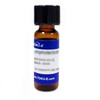21-Hydroxyoligomycin A is a rare member of the Oligomycin class, isolated as a co-metabolite of nemadectin, hence it was originally named Nemadectin omega. Only limited literature references are available. In-house testing suggests that 21-Hydroxyoligomycin has a more selective action against mammalian tumor cell lines than Oligomycin A, exhibiting only weak antifungal and nematocidal activity. 21-Hydroxyoligomycin A can Inhibit K-Ras plasma membrane localization and is therefore a putative anti-cancer agent.
21-Hydroxyoligomycin A is soluble in ethanol, methanol, DMF and DMSO but practically insoluble in water.
We also offer:
- Oligomycin (O037)
- Oligomycin A (O013)
- Oligomycin B (O018)
- Oligomycin C (O019)
- Oligomycin D (O020)
- Oligomycin E (O021)
- 21-Hydroxyoligomycin A (H032)
| Mechanism of Action | 21-Hydroxyoligomycin A can inhibit K-Ras plasma membrane localization are therefore putative cancer chemotherapeutic agents. The study of its inhibitory mechanism of action are expected to reveal pathways and molecular targets to control K-Ras (Salim et al, 2016).
Single-crystal X-ray analysis established the structure and absolute configuration of 21-Hydroxyoligomycin A (Wagenaar et al, 2017). |
| Cancer Applications | It is reported to be cytotoxic to human colon cancer SW620 cells (IC50 = 14.4 μM), and colorectal carcinoma cells (IC50 > 3 µM), to inhibit the ABC transporter efflux pump P-glycoprotein (P-gp). Ras proteins are membrane-bound GTPases that regulate cell growth, proliferation and differentiation. Mutant forms of Ras are prominent in many human cancers. Oncogenic mutant K-Ras must be localized to the plasma membrane to be functional. 21-Hydroxyoligomycin A prevented K-Ras plasma membrane localization (IC50 = 4.82 nM). Oligomycins A-E inhibited K-Ras plasma membrane localization with (IC50 range of ~ 1.5-14 nM (Wagenaar et al, 2007). Inhibitors of K-Ras plasma membrane localization are therefore putative cancer chemotherapeutic agents. The study of K-Ras inhibitory mechanism of action are expected to reveal pathways and molecular targets to control K-Ras. This could inform the development of new probes to better interrogate K-Ras-dependent cancers. |
| Solubility | Soluble in ethanol, methanol, DMF and DMSO but practically insoluble in water. |
| Source | Streptomyces cyaneogriseus ssp. noncyanogenus (LL-F28249) |
| References |
Salim AA et al (2016) Oligomycins as inhibitors of K-Ras plasma membrane localisation. Org. Biomol. Chem. 14(2):711-715 PMID 26565618 |



